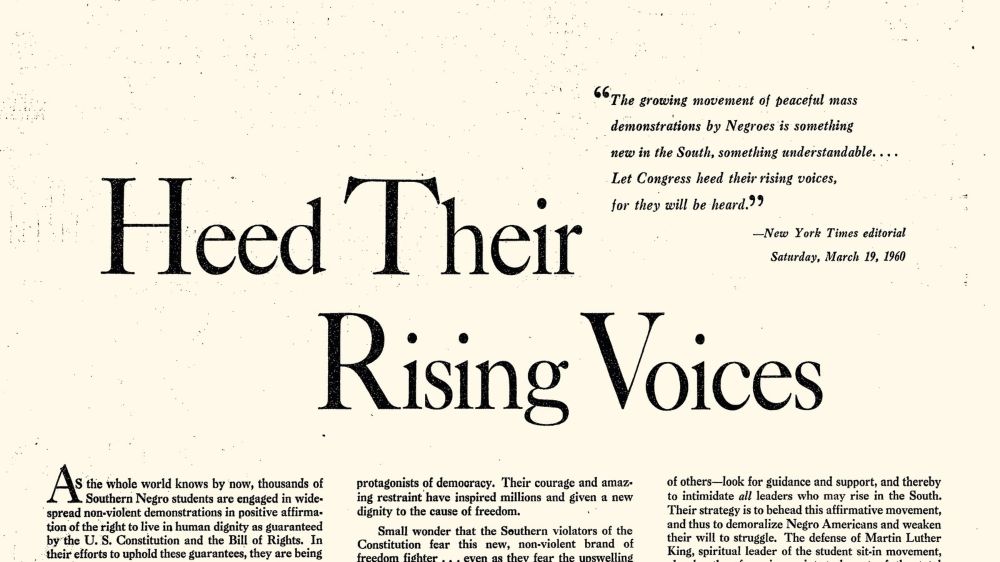If there is one thing that unites former president Donald Trump, Florida Gov. Ron DeSantis, and former Alaska Gov. Sarah Palin, it’s their interest in overturning New York Times Co. v Sullivan. The three are among a growing number of right-wing conservatives who want to revisit the Supreme Court’s 1964 Sullivan decision.
The landmark ruling emerged from a lawsuit brought by L. B. Sullivan, a Mobile, Ala. police commissioner, who sued the New York Times over a full-page ad. The Times’ ad, published in 1960 during Civil Rights struggles, sought donations to defend Martin Luther King Jr. against perjury charges. Sullivan claimed the ad which didn’t mention his name contained several inaccuracies. After a state court awarded Sullivan $500,000, the New York Times Co. appealed to the Supreme Court.
Justice William Brennan authored the majority opinion in New York Times v Sullivan, overturning the lower court. Brennan had the unanimous backing of the court: all nine justices with three concurring opinions by justices who had wanted to go even farther. As it is, the Sullivan ruling severely limits the ability of public figures – public officials and candidates for office and those who insert themselves into the public arena — to sue for defamation and libel. Private figures, such as corporations, are not affected by the Brennan ruling.
It is hard to understate how important this case has been for journalistic freedom. It has been called the clearest and most forceful defense of press freedom in American history. In his decision, Justice Brennan wrote, “Debate on public issues should be uninhibited, robust and wide open.” The court adopted the “actual malice” standard: to prove libel a public figure must show that a statement was known to be false or was printed with reckless disregard. A vivid example of attempting to show actual malice is on display in the Dominion Voting Systems’ $1.6 billion lawsuit against Fox News.
“Actual malice” is a high bar to meet and Donald Trump and others have long chafed at the Sullivan decision. Trump, who identifies the mainstream media as “the public enemy,” has always been ready to file a lawsuit on the flimsiest grounds. How ironic that Trump, who often defames others, is currently suing CNN for defamation, claiming the network libeled him by linking his claims about the 2020 election to Hitler’s use of “the Big Lie.” CNN has moved to dismiss the suit and Trump’s attorneys have filed a response.
Also busy litigating is Sarah Palin, who lost a libel suit against the New York Times in 2022. Federal Judge Jed S. Rakoff rejected Palin’s suit saying that he would dismiss the case even if the jury ruled in her favor (it didn’t). Rakoff said Palin’s legal team failed to provide sufficient evidence she’d been defamed by a 2017 editorial that erroneously linked her to a mass shooting. Palin lost her bid for a new trial when the appeals court found Palin failed to produce “even a speck of evidence.”
No one belongs more strongly in the anti-Sullivan camp than Florida Gov. Ron DeSantis, a likely 2024 presidential contender. The governor has waged an on-going feud with the New York Times, Miami Herald, CNN and the Washington Post and grants interviews only to Fox News.
Last year DeSantis hosted a roundtable discussion with legal experts and media members to discuss the impact of media defamations. He now has staffers working on a proposal to alter the language of Sullivan. Among the proposals: provisions allowing plaintiffs to collect attorney fees, presume all anonymous comments false, ban journalists from withholding the identity of sources, and narrow the definition of a “public figure.” DeSantis, who has little trouble getting his proposals passed by the heavily Republican Legislature, is counting on one bill that has already been drafted, as deplored in this New York Times editorial.
It is perhaps only a matter of time before a case decided under New York Times v Sullivan lands at the Supreme Court. Justice Clarence Thomas has long signaled his interest in revisiting the decision. More recently Justice Neil Gorsuch has questioned the usefulness of Sullivan. It only takes four justices to bring the matter before the Supreme Court and, with a six-person conservative bloc on the Court, it won’t be hard to find two other justices ready to join Thomas and Gorsuch.
The prospect of that conservative bloc, largest in 90 years, overturning or chipping away at Sullivan is frightening. Any such action is guaranteed to make the job of journalists far more difficult. Doing so would deny the public access to truthful and legitimate reporting, depriving audiences around the world of critical information and doing irreparable damage to press freedom.

Thank you for spelling out the threat. Clarence Thomas is already on the record vilifying the press. Whether that would lead to a recusal, however, is another issue.
Being a little philosophical about this.
I hope the Court upholds NY Times v Sullivan. My guess is they will modify it. Not sure. My takeaway is the whichever Court we are talking about – Rhenquist, Warren or other, individual Justice’s views are informed by their life experiences, their law school readings and professors and yes, their politics, which are an amalgam of all. And more. We should expect no less.
When Nominees testify at “confirmation hearings” they will refuse to answer how they might rule. Actually they probably know. When pressed, they sometimes lie.
The Senate majority will then – in rare exceptions – approve them.
So yes, the Port is political in both the broadest and sometimes the narrowest sense.
And then the pendulum will swing. Justices will pass. Elections happen. And new Justices with different views will be confirmed.